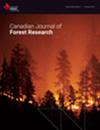OPTIMAL ALLOCATION MODEL OF FOREST FIRE DETECTION TOWERS IN PROTECTED AREAS BASED ON FIRE OCCURRENCE RISK: WHERE AND HOW TO ACT?
IF 1.5
3区 农林科学
Q2 FORESTRY
引用次数: 0
Abstract
Forest fire detection towers are crucial in supporting rapid firefighting actions in conservation units and thus reducing environmental, social, and economic damages. Thus, the aim was to evaluate scenarios for optimal allocation of forest fire detection towers, according to the risk of occurrence, in the Caparaó National Park, Brazil. Thus, by geotechnological analysis, the area’s most susceptible to forest fires and the optimal locations for installation of detection and monitoring for these events were delimited. To run the proposed models, biological, physical, socioeconomic, and meteorological variables were used. From the application of the methodologies, it was observed that 76.70% of the study area was covered by low, moderate, and shallow fire risk classes, while high and very high-risk classes were concentrated in the buffer zone. The scenario with 45 towers was considered the most advantageous, given that they presented viewing levels above 70% and a lower cost per hectare viewed than the scenario with 48 towers. Results showed no critical risks of fire occurrence within the Conservation Unit, but preventive measures are still needed to avoid fire spread, particularly near the buffer zone. The study's methodologies can be applied in other areas to improve forest fire prevention and control efforts.基于火灾发生风险的保护区森林火灾探测塔优化配置模型:在哪里,如何行动?
森林火灾探测塔对于支持保护单位的快速消防行动至关重要,从而减少环境、社会和经济损失。因此,目的是根据发生风险,评估巴西卡帕罗国家公园森林火灾探测塔的最佳配置方案。因此,通过岩土工程分析,确定了该地区最容易发生森林火灾的地区以及安装这些事件的探测和监测的最佳位置。为了运行所提出的模型,使用了生物学、物理、社会经济和气象变量。从方法的应用来看,76.70%的研究区域被低、中等和浅层火灾风险等级所覆盖,而高和极高风险等级则集中在缓冲区。有45座塔楼的场景被认为是最有利的,因为它们的观看水平超过70%,每公顷的观看成本低于有48座塔楼的情况。结果显示,保护区内没有发生火灾的重大风险,但仍需要采取预防措施,以避免火灾蔓延,特别是在缓冲区附近。该研究的方法可以应用于其他领域,以改进森林火灾预防和控制工作。
本文章由计算机程序翻译,如有差异,请以英文原文为准。
求助全文
约1分钟内获得全文
求助全文
来源期刊
CiteScore
4.20
自引率
9.10%
发文量
109
审稿时长
3 months
期刊介绍:
Published since 1971, the Canadian Journal of Forest Research is a monthly journal that features articles, reviews, notes and concept papers on a broad spectrum of forest sciences, including biometrics, conservation, disturbances, ecology, economics, entomology, genetics, hydrology, management, nutrient cycling, pathology, physiology, remote sensing, silviculture, social sciences, soils, stand dynamics, and wood science, all in relation to the understanding or management of ecosystem services. It also publishes special issues dedicated to a topic of current interest.

 求助内容:
求助内容: 应助结果提醒方式:
应助结果提醒方式:


